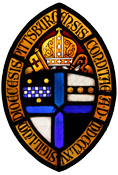March 13, 2020
My dear friends in Christ,
 One week has passed since I first shared with you my thoughts and guidelines concerning our response to the spread of the COVID-19 coronavirus, so today I offer an update. Some of what I will address here is intended to strengthen my original recommendations, while others are new – particularly giving local clergy, in consultation with their lay leaders, discretion to limit certain practices and gatherings within their parishes. These updated guidelines are based on our on-going monitoring of the directives of local, state, and national public health officials, as well as consultation with my fellow bishops in Pennsylvania, and with clergy and lay leadership throughout the diocese.
One week has passed since I first shared with you my thoughts and guidelines concerning our response to the spread of the COVID-19 coronavirus, so today I offer an update. Some of what I will address here is intended to strengthen my original recommendations, while others are new – particularly giving local clergy, in consultation with their lay leaders, discretion to limit certain practices and gatherings within their parishes. These updated guidelines are based on our on-going monitoring of the directives of local, state, and national public health officials, as well as consultation with my fellow bishops in Pennsylvania, and with clergy and lay leadership throughout the diocese.
Gathering for Public Worship
At any time, local clergy, in consultation with their lay leadership, have discretion to suspend public worship in their respective parishes should they deem that necessary. Should any priest make that decision, I ask that they inform me directly in advance. While I believe it is of great importance that we continue to worship on Sundays, to offer the “sacrifice of praise” on behalf of the Church and the world, I do not want our public gatherings to contribute to a public health crisis. My office will be closely monitoring developments, and I will offer updated recommendations next Tuesday.
Should your clergy suspend public worship, I ask that the Holy Eucharist or the Office of Morning Prayer still be conducted at the parish with two or three people present, so that the prayer of the Church gathered can continue in our neighborhoods. Furthermore, I ask parishes under those circumstances to take advantage of available technology either to stream such services or to have their congregations join the online worship of other parishes. Helpful instructions on live-streaming can be found at https://www.episcopalpgh.org/live-streaming-resources.
At this time at least five of our churches are developing plans to offer online services. We will be providing a continually updated list with links on the diocesan website, www.episcopalpgh.org.
The Common Cup
I ask that the common cup continue to be offered throughout the diocese for those who choose to drink from it. I emphasize once again the importance of avoiding intinction. I also grant the clergy full discretion to limit or suspend the administration of the consecrated wine, knowing that Communion in one kind is a full share in the Presence of Christ.
Other Activities at Church
Please keep a distance of at least three feet between you and the person nearest you, while in worship. I know this may seem arbitrary, but “social distancing” has been proven to be a valuable practice in limiting transmission. When passing the Peace, I urge you to avoid physical contact by staying in your pews and greeting only those near you. Please do not embrace or shake hands. Use eye contact, nods, waves, and the like, to share the Peace with others, particularly those at a further distance.
Each parish should examine the practice of how collection plates are passed so that these may be handled by as few people as possible and in a sanitary manner.
I ask you to suspend or modify coffee hours for the time being, and similarly use your best judgment concerning other public gatherings, such as fish fries during Lent. If you are hosting outside groups, particularly 12-step programs, I ask that our clergy and lay leaders work with the leadership of those groups to ensure that reasonable care is taken to preserve a healthy environment in those meetings.
Staying Home and Pastoral Care
While it is desirable that all who are able continue to gather for worship, I do urge those who are more susceptible to illness – older members of our congregation and those with compromised immune systems – to stay home for the immediate future. You will be with us in spirit, and as best able, we will bring church to you. I urge the clergy to empower and train those who can serve as lay Eucharistic visitors in the spiritual and practical matters associated with such visits. All of us should remain mindful and caring of those who may be most affected by illness.
Finally, please continue to share your thoughts and concerns with me and my staff. Things are changing rapidly on the ground, and we always want to hear how we may serve you better. In the meantime, let us be careful stewards of our own health for the sake of the health of those around us. Let us continue to care for and sustain those who may be alone or forgotten in our communities. And let us act without fear, knowing that the Lord is our strength and our salvation, whose steadfast love endures forever (Psalm 118).
Faithfully, your bishop,

(The Right Reverend) Dorsey W.M. McConnell, D.D.
VIII Bishop of Pittsburgh
UPDATED March 13, 2020
The Episcopal Diocese of Pittsburgh
Guide to best practices during the COVID-19 outbreak
Number One: Take Care of Yourself and Your Family.
We are commanded to “honor God in our bodies,” so we should do all we can to promote health, for ourselves and our loved ones. Practice the basics of good hygiene:
-
- Cover coughs or sneezes with the forearm or elbow (not your hands).
- Wash hands frequently: warm water, soap, 20 seconds minimum.
- Use hand cleanser frequently, especially after hand contact with others.
- If you or others in your household are sick, don’t be brave. Stay home.
Number Two: If You Are Healthy, Come to Church!
As The Body of Christ, we are called to community. For now, public worship will continue in the Diocese of Pittsburgh. Local clergy, in consultation with their wardens and vestry, may suspend public worship if deemed advisable.
-
- If suspended, a Eucharist or Morning Prayer with two or three people present should still take place.
- Parishes should promote the use of technology for those unable to attend.
- Older people and those susceptible to illness should consider staying home.
Number Three: While At Church…
At The Peace: Stay in your pews and offer non-physical greetings to only those nearby.
At Communion: The common cup may remain in use for those who drink from it.
-
- Intinction (dipping) is a very bad practice and should be avoided at all costs. Clergy may suspend the distribution of the cup if it causes disharmony.
- When the cup is shared, clergy and lay Eucharistic ministers should use hand sanitizer, and follow proper techniques (wipe and turn) in administering the cup.
- Anyone uneasy about receiving from the common cup should take only the Communion bread – even in one form, it is still fully the Presence of our Lord.
Other Activities: Each parish should re-examine practices and make modifications to:
-
- Taking up the collection, to limit the number of people handling plates.
- How coffee hours and social events are conducted, suspending when possible.
Number Four: Care for the Sick and for Those Who Care for Them.
As the Church has always done, we must continue to do, without fear (Romans 8:15):
-
- Pay attention to those who may be at-risk.
- Reach out and offer appropriate support to health professionals and their families.
- Beyond the walls of our churches, seek out those who might be vulnerable. Find partners in helping them stay healthy and ministering to them should they fall ill.
- We are to love those whom Jesus loves, which is absolutely everyone.
